Table of Contents
Daily Current Affairs for Government Exams:
Today Current Affairs: 13th February 2020 for UPSC IAS exams, State PSC exams, SSC CGL, State SSC, RRB, Railways, Banking Exam & IBPS, etc
Contents:
- COVID-19.
- Yaravirus :
- School Health Ambassador initiative launched:
- Changes in vivaad se vishwas scheme.
- No right to detain children in conflict with the law in a lockup or a jail.
- Pan-India New Umbrella Entity (NUE):
- QAnon.
- Jal Jeevan Mission.
- India- Sri Lanka.
- Pesticides Management Bill, 2020.
- Major Port Authority Bill, 2020
- Other important current affairs.
1. COVID-19:
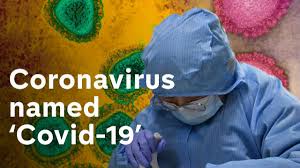
The World Health Organization (WHO) gave an official name for the illness caused by the new coronavirus: COVID-19.
- The virus will now be called “COVID-19”; the “CO” stands for coronavirus, “VI” for the virus, “D” for disease and “19” for 2019, as the illness was first detected toward the end of last year.
- Until now, versions of the following nomenclature were being used for coronavirus: “nCoV-2019”.
How do the WHO name-new diseases?
- Under international guidelines, the WHO had to find a name that did not refer to a geographical location, an animal, an individual or group of people, and which is also pronounceable and related to the disease.
- The names should also be short and should be consistent with the guidelines under the International Classification of Diseases (ICD) Content Model Reference Guide.
- International Classification of Diseases (ICD), which is also managed by the WHO, provides a final standard name for each human disease according to standard guidelines.
2. Yaravirus :
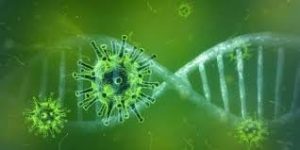
In a lake in Brazil, researchers have discovered a virus called Yaravirus that has a “puzzling origin and phylogeny.”
- The Yaravirus infects amoeba and has genes that have not been described before, something that could challenge how DNA viruses are classified.
- Over 90% of the Yaravirus’s genome has not been observed before.
- Because of the Yaravirus’s small size, it was unlike other viruses that infect amoeba and they named it as a tribute to Yara, the “mother of waters” in the mythological stories of the Tupi-Guarani indigenous tribes.
- The virus does not infect human cells.
- Although it is only now that the virus has been identified, the researchers believe that it has been present on Earth for ages.
3. Ayushman Bharat: School Health Ambassador initiative launched:
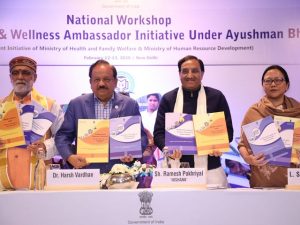
The Ministry of Health and Family Welfare introduced the School Health Ambassador initiative. Under the initiative, two teachers in every school are to be made as a Health and Wellness ambassador.
- The initiative is to be linked with other initiatives such as Eat Right Campaign, Fit India Movement and Poshan Abhiyan.
- 11 themes have been identified for the initiative. It includes:
- growing up healthy,
- interpersonal relationships,
- emotional well-being,
- values, and responsible citizenship,
- nutrition, health,
- gender equality,
- promotion of healthy lifestyles,
- HIV prevention,
- safety and security against violence and
- promotion of safe use of the internet.
- The 2 ambassadors appointed under the scheme will work on the above themes. They will focus on health promotion and prevention components.
- Training: The ambassadors are to be trained by the National Resource Group that was constituted by the NCERT.
- The initiative in the first phase is to be implemented in upper primary and secondary schools in aspirational districts.
- The remaining districts are to be included in the second year of the initiative.
4. Changes in Vivaad Se Vishwas scheme:

The Vivad se Vishwas Scheme was announced by Finance Minister Nirmala Sitaraman during the Budget 2020-21. On February 12, 2020, the Union Cabinet approved to make required changes in the Vivad Se Vishwas Bill, 2020 in order to widen its cover over litigation pending in debt recovery tribunal.
- The amendment has been introduced in order to widen the scope of the scheme in the debt recovery tribunal.
About the Scheme:
- The scheme focuses on taxpayers whose tax demands are locked in multiple disputes.
- It is similar to the Indirect Tax Sabka Vishwas Scheme.
- The scheme aims to resolve 483,000 direct tax dispute cases that are pending in various appellate.
- The scheme aims to release 9 lakh crore direct taxes that are locked up in litigation.
The bill introduces a resolution mechanism through which an appellant can file a declaration. The authority (resolution mechanism implementer) will determine the amount payable within 15 days of the receipt of the declaration.
5. No right to detain children in conflict with the law in a lockup or a jail.:
The Supreme Court has made it clear that the police have no right to detain children in conflict with the law in a lockup or a jail. The order came after the recent media reports about “children being detained in police custody and tortured in Delhi and Uttar Pradesh” in connection with the protests against the Citizenship (Amendments) Act.
- A juvenile in conflict with the law, if apprehended, has to be placed immediately under the care of the special juvenile police unit or a designated child welfare officer.
- The child has to be produced before the Juvenile Justice Board (JJB).
- Once a child is produced before a JJB, bail is the rule.
- If for some reason bail is not granted, a child cannot be put behind bars. He has to be lodged either in an observation home or in a place of safety.
- The law is meant to protect children and not detain them in jail or keep them in police custody.
6. Pan-India New Umbrella Entity (NUE):

The Reserve Bank of India (RBI) has released a ‘draft framework for authorization of a pan-India New Umbrella Entity (NUE) for Retail Payment Systems’.
- RBI has proposed to set up a new pan-India new umbrella entity (NUE) or entities focussing on retail payment systems with a minimum paid-up capital of Rs 500 crore.
- The proposed entity will set up, manage and operate new payment systems especially in the retail space comprising of ATMs, white-label PoS, Aadhaar-based payments, and remittance services, develop payment methods, standards, and technologies, monitor related issues, etc.
- No single promoter or promoter group should have more than 40 percent investment in the capital of the entity.
- The promoters should upfront demonstrate the capital contribution of not less than 10 percent — Rs 50 crore — at the time of making an application for setting up the entity.
- The promoter or the promoter group shareholding should be diluted to a minimum of 25 percent after 5 years of the commencement of business. A minimum net worth of Rs 300 crore should be maintained.
- The entity eligible to apply as a promoter or the promoter group for the NUE should be ‘owned and controlled by residents’ with 3 years’ experience in the payments ecosystem as Payment System Operator (PSO) or Payment Service Provider (PSP) or Technology Service Provider (TSP).
7. QAnon:

QAnon, a conspiracy theory, has now surfaced in political campaigns, criminal cases, merchandising and at least one college class.
- QAnon is a far-right conspiracy theory detailing a supposed secret plot by an alleged “deep state” against U.S. President Donald Trump and his supporters.
- The theory began with an October 2017 post on the anonymous imageboard 4chan by someone using the name Q, a presumably American individual that may have later grown to include multiple people.
- “Q” is a reference to the top-secret Q clearance.
- QAnon believers commonly tag their social media posts with the hashtag #WWG1WGA, signifying the motto “where we go one, we go all.”
8. Jal Jeevan Mission:
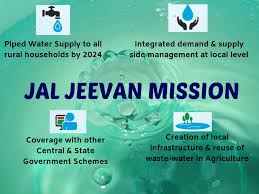
Rajasthan has demanded higher central assistance for Jal Jeevan Mission (JJM) to achieve the targets of the mission.
Jal Jeevan Mission:
- Jal Jeevan Mission (JJM) envisages supply of 55 litres of water per person per day to every rural household through Functional Household Tap Connections (FHTC) by 2024.
- JJM focuses on integrated demand and supply-side management of water at the local level.
- The creation of local infrastructure for source sustainability measures as mandatory elements, like rainwater harvesting, groundwater recharge, and management of household wastewater for reuse, would be undertaken in convergence with other government programs/schemes.
- The fund sharing pattern between the Centre and states is 90:10 for Himalayan and North-Eastern States, 50:50 for other states, and 100% for Union Territories.
The Central government has recently released the operational guidelines for JJM. For the implementation of JJM, following institutional arrangement has been proposed:
- National Jal Jeevan Mission (NJJM) at the Central level
- State Water and Sanitation Mission (SWSM) at the State level
- District Water and Sanitation Mission (DWSM) at the District level
- Village Water Sanitation Committee (VWSC) at Village level
- Every village will prepare a Village Action Plan (VAP) which will have three components:
- Water source & its maintenance
- Water supply and Greywater (domestic wastewater) management.
9. India- Sri Lanka:
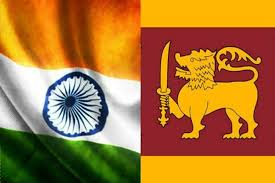
At the invitation by the Prime Minister of India, Sri Lankan Prime Minister Mahinda Rajapaksa visited India from 8th–11th February 2020.
Key Points:
Tamil Issue:
- India expressed confidence in Sri Lanka to carry forward the process of reconciliation of Tamils in Sri Lanka.
Development in War Affected Areas:
- Sri Lanka has requested India to build more houses in the north and east.
- India has so far helped build 46,000 homes in the war-affected areas.
- It has also requested to provide assistance for deep-sea fishing techniques which will help to create employment opportunities for people.
Joint Marine Resources Management Authority:
- Sri Lanka has also proposed to set up a Joint Marine Resources Management Authority between two countries.
The commission will have seven members from either side, including bureaucrats, researchers, fishermen’s association representatives.
Debt Trap:
- They also discussed countering ‘debt traps’ experienced by Sri Lanka.
- Debt-trap diplomacy refers to the strategy used by China to lure or trap developing or underdeveloped countries like in Africa to borrow money to be used for much-needed infrastructure projects.
Indian Ocean Region:
- Both the countries agreed to provide close cooperation for peace and prosperity in the Indian Ocean Region and even in the Indo-Pacific region.
- India also reinforced the security of the Indian ocean with its ‘Neighbourhood First’ policy and SAGAR (Security and Growth for all in the Region).
- SAGAR is an articulation of India’s vision for the Indian Ocean.
- SAGAR has elements such as enhancement of capacities to safeguard land and maritime territories & interests; deepening economic and security cooperation in the littoral; action to deal with natural disasters and maritime threats like piracy, terrorism.
Terrorism:
- Both countries aimed to strengthen the contacts and cooperation between the counter-terrorism agencies of the two countries.
10. Pesticides Management Bill, 2020:
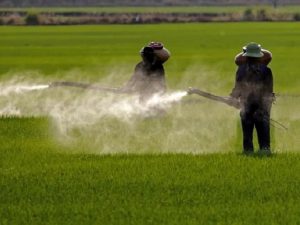
The Pesticides Management Bill, 2020 has been approved by the Union Cabinet.
- The Bill will regulate the business of pesticides and compensate farmers in case of losses from the use of agrochemicals.
- Agrochemicals imply chemicals used in agriculture, such as a pesticide or fertilizer.
- Currently, the pesticide business is regulated by rules under the Insecticides Act 1968.
Key Features of the Bill
- Pesticide Data: It will empower farmers by providing them with all the information about the strength and weaknesses of pesticides, the risk, and alternatives. All information will be available openly as data in digital format and in all languages.
- Compensation: The Bill has a unique feature in the form of a provision for compensations in case there is any loss because of the spurious or low quality of pesticides. If required, a central fund will be formed to take care of the compensations.
- Organic Pesticides: The Bill also intends to promote organic pesticides.
- Registration of Pesticide Manufacturers: All pesticide manufacturers have to be registered and bound by the new Act, once it is passed. The advertisements of pesticides will be regulated so there should be no confusion or no cheating by the manufacturers.
11. Major Port Authority Bill, 2020:
The Cabinet has given its nod to Major Ports Authority Bill that will replace a 1963 law governing country’s 12 major ports.
- At present, the ports are governed by a ports law of 1963.
- The major port sector has not seen the required level of fixed assets creation to pare the country’s high logistics costs owing to legacy issues including the Tariff Authority for Major Ports (TAMP)’s archaic regulatory grip.
Overview of the Bill:
- The proposed law is aimed at enhancing the overall efficiencies of the ports.
- Now ‘major ports’ will get to determine the tariffs for various port-related services as well as the terms for private developers who team up with them.
- Every port will now be governed by a Port Authority which will have powers to fix reference tariffs for various port services.
- The Bill also proposes the creation of an adjudicatory board at the apex level for review of port authority’s decisions.
- It will have the mandate to resolve the disputes between port authorities and the PPP operators.
Major Ports in India:
India has 12 major ports — Deendayal (erstwhile Kandla), Mumbai, JNPT, Marmugao, New Mangalore, Cochin, Chennai, Kamarajar (earlier Ennore), V O Chidambarnar, Visakhapatnam, Paradip and Kolkata (including Haldia).
Other important current affairs:
1. The Union Cabinet approved to table the Pesticide Management Bill, 2020 in Parliament. The bill aims at making safe and effective pesticides for farmers. The main aim of the bill is to replace the Insecticides Act, 1968.
- The bill includes provisions to provide compensation when there is farm loss due to the use of low-quality pesticides.
- The loss of farmers is to be paid using funds collected from the manufacturers.
- The information regarding the pesticides available in the market is to be made available in digital format.
- This will help farmers make the right choice.
2. The Union Cabinet approved the Memorandum of Understanding signed between India and Iceland in the field of fisheries.
- According to the agreement, the countries agreed to create facilities of technical experts and scientists inshore areas and deep-sea areas. They also agreed on the exchange of scientific research literature, scientific experts in the field of fisheries.
- The agreement strengthens bilateral cooperation between India and Iceland.
- According to the Economic Survey 2020, fisheries contribute to 6.58% of India’s GDP along with agriculture and forestry.
- The export of marine products for the year 2018-19 was 13.92 lakh tonnes.
- The survey also says that the total fish production of the country stood at 13.42 million tonnes in the year 2018-19.
- The major fisheries resources of India is spread across the vast coastline.
3. World Radio Day is being observed on February 13, 2020. The theme of this year is Radio and Diversity.
- In 2013, the United Nations General Assembly formally endorsed UNESCO’s proclamation of World Radio Day.
- During its 67th Session, the UN General Assembly adopted a resolution proclaiming 13 February as World Radio Day.
- The day is observed every year on this date to raise greater awareness among the public and the media of the importance of radio.
- Radio is a low-cost medium specifically suited to reach remote communities and vulnerable people.
4. KOTA RANI: Kutte Kol is a navigational canal running through the Srinagar.
- Among several other reasons why the government believed Mehbooba Mufti, the former chief minister of J&K, should be detained under the Public Safety Act (PSA) was a reference to her being likened to Kota Rani for her “dangerous and insidious machination and usurping nature”.
- Kota Rani (died 1339), was the last ruler of the Hindu Lohara dynasty in Kashmir.
- She was the daughter of Ramchandra, the commander-in-chief of Suhadev, who was the king of Kashmir belonging to the Lohara dynasty.
- She was regent during the minority of her son, and ruled as monarch until 1339.
- She was deposed by Shah Mir, who became the first Muslim ruler of Kashmir.
5. The Supreme Court has questioned the Andhra Pradesh government’s decision in 1988 to provide a 100% reservation to Scheduled Tribes for teacher posts in Scheduled Areas.
- The Supreme Court has mentioned that the 100% reservation would deprive other backward communities (including SCs, OBCs) of availing reservation benefits.
- The notification to provide a 100% reservation to Scheduled Tribes (STs) for teacher posts in Scheduled Areas was issued by then governor of the Andhra Pradesh.
- The Fifth Schedule of the Indian Constitution dealing with the administration of Scheduled Areas vests the Governor with legislative and administrative powers.
- The Supreme Court also questioned the availability of data based on which the Governor of the Andhra Pradesh decided that ST is the only deprived group in the area.
- Article 16 (4) of the Constitution empowers the state to make any provision for the reservation of appointments or posts in favor of any backward class of citizens which, in the opinion of the state, is not adequately represented in the services under the state.
.
6. Voting Rights of Prisoners: The Delhi High Court has rejected a petition seeking voting rights for prisoners.
- Observations made by the Court: The right to cast vote is neither a fundamental right nor a common law right and is only provided by a statute.
- The right to vote provided under the statute — Representation of the People Act — was subject to restrictions imposed by the law, which does not allow prisoners to cast vote from jails.
- Under Section 62(5) of the Representation of the People Act, 1951, individuals in the lawful custody of the police and those serving a sentence of imprisonment after a conviction cannot vote.
- Undertrial prisoners are also excluded from participating in elections even if their names are on electoral rolls.
- Only those under preventive detention can cast their vote through postal ballots.
7. The Tripura Tribal Areas Autonomous District Council (TTAADC) has passed resolutions to codify the customary laws of three tribal clans- Mizo, Kaipeng, and Malsom.
- As per the Sixth Schedule, the four states viz. Assam, Meghalaya, Tripura, and Mizoram contain the Tribal Areas which are technically different from the Scheduled Areas.
- Though these areas fall within the executive authority of the state, provision has been made for the creation of the District Councils and regional councils for the exercise of certain legislative and judicial powers.
- Each district is an autonomous district and the Governor can modify/divide the boundaries of the said Tribal areas by notification.
8. The Indian Naval Ship (INS) Jamuna has been deployed in the shores of Sri Lanka to carry out a joint Hydrographic survey. The survey is to be conducted for 2 months time period.
- India and Sri Lanka together are to carry out a Hydrographic survey and also shore-based survey activities for a period of 2 months. Apart from surveying, the Sri Lankan Naval Officers will be provided survey training.
- The Hydrographic survey is the measurement and study of features that affect maritime navigation. It also includes offshore oil exploration, dredging, oil drilling, and other related activities.
9. CA Atul Kumar Gupta has been elected as the new President of the Institute of Chartered Accountants of India (ICAI) for the term 2020-21.
- Nihar Niranjan Jambusaria has been elected as the Vice President of the ICAI for 2020-21.
- The Institute of Chartered Accountants of India (ICAI) is the national professional accounting body of India, established on 1st July 1949.
10. Mumbai to get India’s largest air quality monitoring network
- The Brihanmumbai Municipal Corporation (BMC) will develop an air quality monitoring network across 90 locations in Mumbai.
- This will make it the largest network in India, as per a report in Hindustan Times
- BMC is planning to invest Rs. 9.5 crores to install 80 real-time air monitoring stations.
- These stations will give location-wise updates on the quality of air.
11. Prez Kovind presents President’s Colour to Indian Navy’s INS Shivaji
- President Ram Nath Kovind presented Colors to Indian Navy’s INS Shivaji at Lonavala, near Mumbai.
- INS Shivaji is commemorating 75 years (Platinum Jubilee) of its glorious service to the Indian Navy this month.
- The President’s Colour is the highest honor that can be bestowed upon any military unit.
- The motto of this establishment is Karmasu Kaushalam which translates to imbibing the concept of Skill at Work in all facets of human endeavor.
12. Dharmendra Rai’s book “The Thin Mind Map Book” launched
- “The Thin Mind Map Book” authored by a mind mapping & brain literacy pioneer Dharmendra Rai was launched recently.
- The book is designed to make anyone an expert in mind mapping by devoting 2 full days to reading & doing all the experiential exercises mentioned in the book.
- Mr. Rai is a mind mapping & brain literacy pioneer and has a world record of conducting more than 380 mind mapping seminars in under 10 years.
13. Amit Shah inaugurates India’s first BIMSTEC conference
- Union Home Minister Amit Shah inaugurated a two-day Conference on Combating Drug Trafficking for BIMSTEC Partner Nations at the Vigyan Bhawan in New Delhi.
- The conference is being organized by the Narcotics Control Bureau.
- This platform will provide an opportunity to all the member nations to deliberate on the increased threats posed by drug trafficking.
14. Naveen Patnaik inaugurates the 2nd BIMSTEC Disaster Management Exercise2020
- Odisha CM Naveen Patnaik has inaugurated the 2nd BIMSTEC Disaster Management Exercise hosted by the National Disaster Response Force (NDRF) in Bhubaneswar.
- The theme of this year’s exercise is “A cultural heritage site that suffers severe damage in the earthquake and flooding or storm.”
- Five-member countries(India, Bangladesh, Myanmar, Sri Lanka, Myanmar, and Nepal) are participating in this (Bhutan and Thailand not participating).




